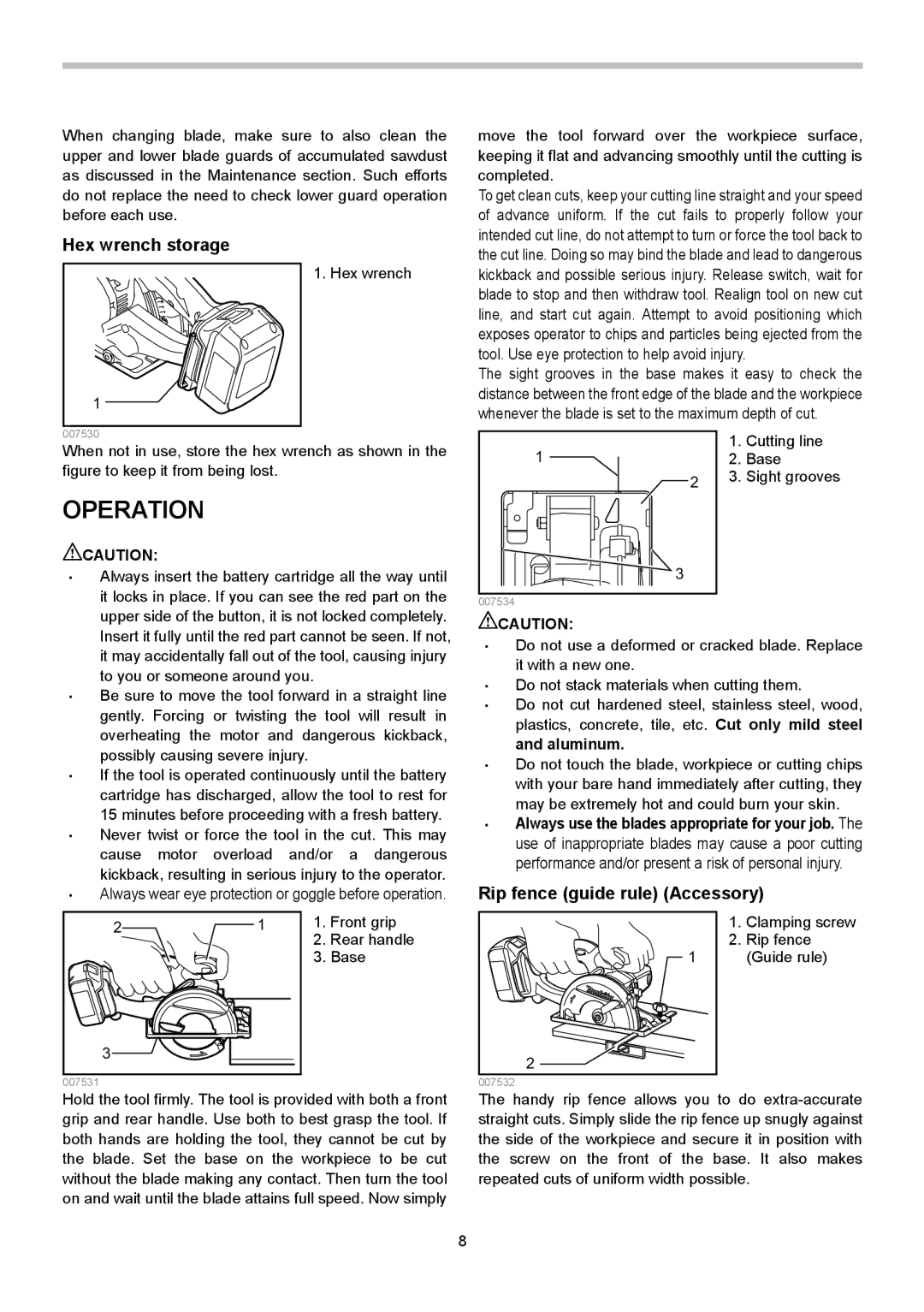
When changing blade, make sure to also clean the upper and lower blade guards of accumulated sawdust as discussed in the Maintenance section. Such efforts do not replace the need to check lower guard operation before each use.
move the tool forward over the workpiece surface, keeping it flat and advancing smoothly until the cutting is completed.
To get clean cuts, keep your cutting line straight and your speed of advance uniform. If the cut fails to properly follow your intended cut line, do not attempt to turn or force the tool back to
Hex wrench storage
1 ![]()
007530
1. Hex wrench
the cut line. Doing so may bind the blade and lead to dangerous kickback and possible serious injury. Release switch, wait for blade to stop and then withdraw tool. Realign tool on new cut line, and start cut again. Attempt to avoid positioning which exposes operator to chips and particles being ejected from the tool. Use eye protection to help avoid injury.
The sight grooves in the base makes it easy to check the distance between the front edge of the blade and the workpiece whenever the blade is set to the maximum depth of cut.
1. Cutting line |
When not in use, store the hex wrench as shown in the figure to keep it from being lost.
OPERATION
| CAUTION: |
• | Always insert the battery cartridge all the way until |
| it locks in place. If you can see the red part on the |
| upper side of the button, it is not locked completely. |
| Insert it fully until the red part cannot be seen. If not, |
1 |
2 |
3 |
007534 |
![]() CAUTION:
CAUTION:
2. | Base |
3. | Sight grooves |
| it may accidentally fall out of the tool, causing injury |
| to you or someone around you. |
• | Be sure to move the tool forward in a straight line |
| gently. Forcing or twisting the tool will result in |
| overheating the motor and dangerous kickback, |
| possibly causing severe injury. |
• | If the tool is operated continuously until the battery |
| cartridge has discharged, allow the tool to rest for |
| 15 minutes before proceeding with a fresh battery. |
• | Never twist or force the tool in the cut. This may |
| cause motor overload and/or a dangerous |
| kickback, resulting in serious injury to the operator. |
• | Always wear eye protection or goggle before operation. |
•Do not use a deformed or cracked blade. Replace it with a new one.
•Do not stack materials when cutting them.
•Do not cut hardened steel, stainless steel, wood, plastics, concrete, tile, etc. Cut only mild steel and aluminum.
•Do not touch the blade, workpiece or cutting chips with your bare hand immediately after cutting, they may be extremely hot and could burn your skin.
•Always use the blades appropriate for your job. The use of inappropriate blades may cause a poor cutting performance and/or present a risk of personal injury.
Rip fence (guide rule) (Accessory)
2 | 1 | 1. | Front grip |
|
| 2. | Rear handle |
|
| 3. | Base |
3 |
|
|
|
007531 |
|
|
|
1
2![]()
007532
1.Clamping screw
2.Rip fence (Guide rule)
Hold the tool firmly. The tool is provided with both a front grip and rear handle. Use both to best grasp the tool. If both hands are holding the tool, they cannot be cut by the blade. Set the base on the workpiece to be cut without the blade making any contact. Then turn the tool on and wait until the blade attains full speed. Now simply
The handy rip fence allows you to do
8
